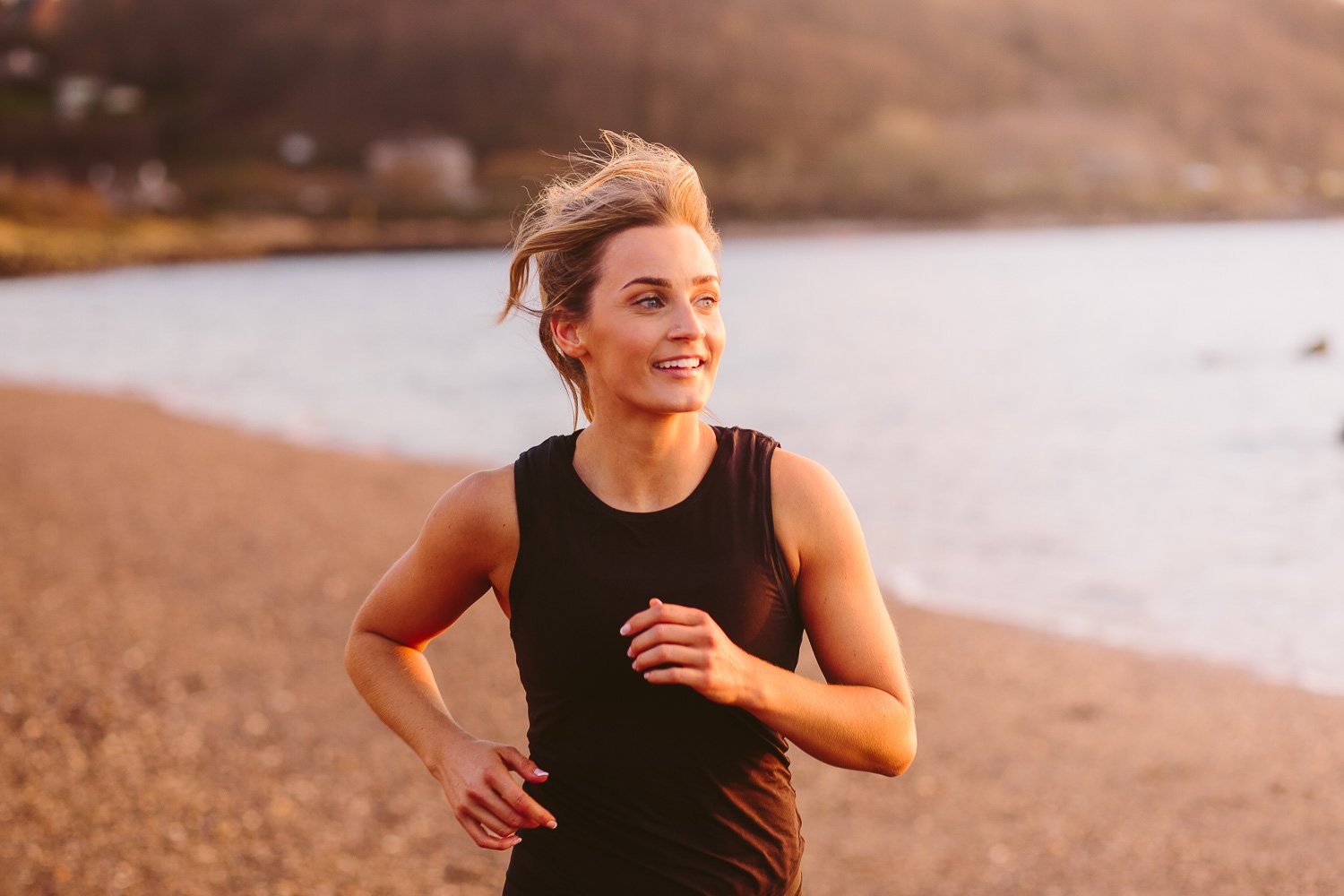Fuelling for endurance sports performance
Pip recently sat down with dietitian and sports nutritionist, Kerri Major, to discuss fuelling for endurance sports. From elite athletes to everyday recreational athletes, they talk through fuelling for performance and getting the most from your nutrition*.
Dietitian and sports nutritionist, Kerri Major. Photo: Daniel McAvoy
Pip: One of the things I suffer from is I’m guilty of putting my love and time into the boat and forgetting that I am a point of failure as well. During last Vendee Globe over 3 months I lost 9 kilos of weight and by the end of the race I was tiny. Like so many, I have a busy life and struggle to look after myself and I was shocked how quickly the muscle mass and weight fell off me.
Kerri: I work with a lot of runners but for you the nature of such a sport you’re on the clock all the time and I’m not surprised that you lost that weight, it’s trying to minimise losses of muscle mass when on the boat and a lot of fuel is needed for that.
Pip: One of things I underestimated was temperature - how does that affect calories burned?
Kerri: It comes down to hydration, for sailors that’s a difficulty and generally day to day people don’t drink enough. For athletes it’s more paramount and that’s often where performance dietitians would get involved, looking at how do we help you hit hydration needs to maximise training and competitions. We might look at weighing before and after sessions and looking at what you’ve drank and work out a hydration strategy from there. For everyday athletes most of the time you just need to look at the colour of your urine, you’re aiming for a pale yellow straw colour and that USUALLY indicates you’re hydrated enough.
Pip: I discovered that myself when sailing in races, if making bad decisions I would think why did I do that? I then realised just how fatigue and dehydration can make a difference to risk assessment.
Kerri: Yes it’s one of the things that should be a top of priority for endurance athletes.
Pip: Why do people underestimate it?
Kerri: When we get to the point we feel thirsty, we are already dehydrated so keeping hydrated through the day is hard because you can often feel hungry first so you end up grabbing food, so it’s good to think about drinking slowly throughout the day. I think a lot of people aren’t aware of their fluid needs and so find it difficult to maintain it. But more often than not, when we start to drink more, our body will usually get used to tolerating this larger amount over time.
Pip: When I go into the Southern Ocean I could spend 6 weeks there and the water temperature there is about 6/7 degrees. Drinking cold water is the last thing I want to do so I reach for hot drinks, does a blend of tea and water make a difference?
Kerri: There’s more research to show even things like caffeine (unless you drink a significant amount of it) doesn’t impact hydration so drinking tea and coffeeetc. can be ok. It’s just making sure there’s a balance and making sure it doesn’t impact your sleep. Caffeine can have a positive impact on performance so but getting the timing right is essential to make sure you get the benefit.
Pip: Last time in the Vendee Globe we underestimated how many calories I needed and now I’ve upped the amount. I have a 24-hour bag of food, all freeze dried and fruit bars. I take the bag out and my job is to eat everything in the bag in 24 hours which is hard. Freeze-dried food has really come one in the time I’ve been racing, I love my food but the things I love are the things I can’t have in the ocean like fresh fruit and veg. So for me it’s fuel in fuel out. If you’re doing a big session what’s your go-to meal after?
Kerri: Main things to focus on after exercise are the four Rs of Nutrition. Recovery – refuel with carbs to replenish your glycogen stores so you’re fuelled for your next session and in general, to fuel your active lifestyle. Repair with protein to support the growth and repair of muscle tissue growth (e.g. chicken, meat, fish and plant-based options). Rehydrate with fluids +/- electrolytes to replace sweat losses. And the final thing is revitalising with fruit and veg to support the immune system, getting vitamins and minerals on board,. Exercise is a stressor, albeit usually a good stressor but it does put the body under pressure so it’s good to make sure you’re getting good food to help it recover.
Photo: James Tomlinson
Pip: What about timings? I have a boat life and a land life, boat life I just need to remind myself to eat at every opportunity. But on the land there’s a lot of conflicting advice about when and how you should eat
Kerri: One of the biggest things I work with people on is to make sure they’re getting a meal pattern in there, building good habits and getting enough calories in to support an active lifestyle, and that doesn’t have to be elite athletes – it could be a busy working Mum who also exercises and runs about after the kids. It’s about looking for opportunities to get calories and nutrients in and don’t be afraid of snacking. People are concerned they’ll put on weight through snacking but if you focus on the make up of a snack it can be a great opportunity to get nutrients in. Think of them like mini meals. From a time point of view, breakfast lunch and dinner is ideal and spreading snacks out throughout the day. This is also important for people hitting higher protein goals - someone active could be needing 1.6 to 2.2g per kg of body weight a day and that can be quite high, so quite often it helps to focus on this total protein target first and then distribute your protein intake throughout the day. For optimising muscle growth it’s trying to get 20-30g of protein in every sitting.
Pip: Is there an argument for not overthinking it?
Kerri: Yes, there’s so much nutrition noise because everyone eats and everyone has an opinion so the lines can get a bit blurred. Information is overwhelming and confusing so I think it’s bringing it back to basics, usually just trying to focus on food first - what can you add to your diet to support health and performance first?
Pip: We have some questions from the community – what about tips for vegetarians trying to increase protein?
Kerri: It can be done, it’s just about being wise with choices. Vegetarians and vegans can come into difficulty when they don’t consider what food sources they need to include if they are excluding meat and dairy. For example, individuals who exclude dairy and choose plant-based alternatives instead often don't choose options that are being fortified with calcium. If we refer back to the UK Government’s Eat Well guide, 'dairy and fortified alternatives' forms a food group of its own to ensure we are getting enough calcium in to support our bone health, so it's important we choose appropriate alternatives if excluding dairy. I believe it's important to be aware of where your nutrients come from and if you are unsure book an appointment with a dietitian to help increase your knowledge with evidence-based advice so you then know how apply the knowledge yourself.
Pip: What food would you recommend for endurance sports?
Kerri: No one particular food but one food type would be carbohydrates, so many people don’t eat enough because they’re feared so much but carbs are king when it comes to performance. They’re the first form of energy the body and brain wants to use, so you need to fuel yourself with them. We don’t just get energy from carbs like bread and pasta, it can be in lots of foods from dried fruit to honey and they all have their place. That’s where performance nutrition differs to healthy eating, processed carbs can be appropriate fuelling for sport to meet higher energy needs.
Pip: Healthy on the go snack ideas?
Kerri: You want to think about them as mini meals. My checklist would be does it have a source of carbohydrates and protein and are there some fruit and veg in there? So anything from yoghurt and fruit, crackers with tuna, cucumber and tomato, to bagels with cream cheese and smoked salmon. Don’t be afraid of including snacks - our body needs fuel and they can be an excellent way of getting in more nutrients. By spreading your meals and snacks up throughout the day, can help to support energy levels throughout the day and reduce the risk of choosing more high sugar/high fat snack options. If you’re craving something, I often encourage clients to have a think about whether there’s an opportunity to add in more nutrients to their diet first, then if you’re still craving whatever it is, honour that craving. Whether it’s chocolate, crisps or biscuits etc - if anyone ever tells you to cut out your favourite food run for the hills because they can 100% form part of a healthy diet, it’s just thinking how often you have them and if they’re often displacing opportunities for you to include more nutrient dense foods in your diet.
*The information in this interview is not designed to give individual nutritional advice - there is no one-size-fits all approach. If you’re seeking nutrition advice speak to a registered dietitian or *registered* nutritionist.


